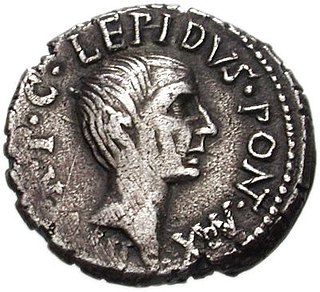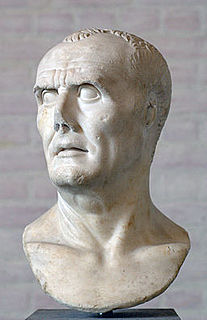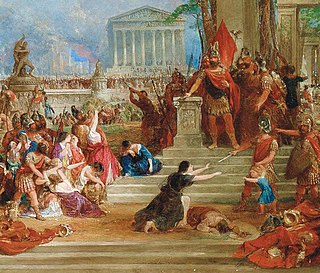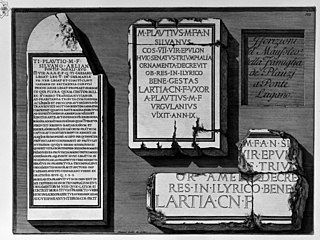 W
WMarcus Aemilius Lepidus was a Roman general and statesman who formed the Second Triumvirate alongside Octavian and Mark Antony during the final years of the Roman Republic. Lepidus had previously been a close ally of Julius Caesar. He was also the last Pontifex Maximus before the Roman Empire.
 W
WPublius Cornelius Scipio Africanus was a Roman general and later consul who is often regarded as one of the best military commanders and strategists of all time. His main achievements were during the Second Punic War. His greatest military achievement was the defeat of Hannibal at the Battle of Zama in 202 BC. The victory was one of the feats that earned him the agnomen he is best known for: Africanus.
 W
WPublius Cornelius Scipio Nasica was a consul of ancient Rome in 191 BC. He was a son of Gnaeus Cornelius Scipio Calvus. Sometimes referred to as Scipio Nasica the First to distinguish him from his son and grandson, he was a cousin of Scipio Africanus.
 W
WPublius Cornelius Scipio was a general and statesman of the Roman Republic and the father of Scipio Africanus.
 W
WGaius Julius Caesar was a Roman general and statesman who played a critical role in the events that led to the demise of the Roman Republic and the rise of the Roman Empire.
 W
WDecimus Junius Brutus Callaicus was a consul of the Roman Republic for the year 138 BC together with Publius Cornelius Scipio Nasica Serapio. He was an optimate politician and a military commander in Hispania and in Illyria. He was the son of Marcus Junius Brutus and brother of Marcus Junius Brutus. He had a son also named Decimus Junius Brutus and his grandson was Decimus Junius Brutus Albinus.
 W
WGaius Marius was a Roman general and statesman. Victor of the Cimbric and Jugurthine wars, he held the office of consul an unprecedented seven times during his career. He was also noted for his important reforms of Roman armies. He was at the centre of a paradigmatic shift from the militia levies of the middle Republic to the professional soldiery of the late Republic; he also improved the pilum, a javelin, and made large-scale changes to the logistical structure of the Roman army.
 W
WLucius Mummius, was a Roman statesman and general. Mummius was the first of his family to rise to the rank of consul, making him a novus homo. He received the agnomen Achaicus for his victories while consul in 146 BC, when he conquered the Achaean League and destroyed the ancient city of Corinth following the Battle of Corinth, in the process bringing all of Greece under Roman control.
 W
WTiberius Plautius Silvanus Aelianus was a Roman patrician who twice served as consul, in 45 and 74 AD. He was the adopted nephew of Plautia Urgulanilla, first wife of the emperor Claudius. It is known he offered up the prayer as pontifex when the first stone of the new Capitol was laid in 70 AD. In some ancient sources he is referred to as Plautius Aelianus, but we learn from an inscription that his full name was Tiberius Plautius Silvanus Aelianus, and that he held many important military commands.
 W
WSextus Pompeius Magnus Pius, also known in English as Sextus Pompey, was a Roman military leader and politician who throughout his life upheld the cause of his father, Pompey the Great, against the dictator Julius Caesar and his supporters, during the last civil wars of the Roman Republic. He formed the last organized opposition to the Second Triumvirate, in defiance of which he succeeded in establishing an independent state in Sicily for several years.
 W
WGnaeus Pompeius Magnus, known by the anglicisation Pompey the Great, was a leading Roman general and statesman, whose career was significant in Rome's transformation from a republic to empire. He was for a time a political ally and later enemy of Julius Caesar. A member of the senatorial nobility, Pompey entered a military career while still young and rose to prominence serving the later dictator Sulla as a commander in Sulla's civil war, his success at which earned him the cognomen Magnus – "the Great" – after Pompey's boyhood hero Alexander the Great. His adversaries also gave him the nickname adulescentulus carnifex for his ruthlessness. Pompey's success as a general while still young enabled him to advance directly to his first consulship without meeting the normal cursus honorum. He was consul three times and celebrated three Roman triumphs.
 W
WLucius Cornelius Sulla Felix, commonly known as Sulla, was a Roman general and statesman who won the first large-scale civil war in Roman history and became the first man of the Republic to seize power through force. He had the distinction of holding the office of consul twice, as well as reviving the dictatorship. Sulla was a gifted and innovative general, achieving numerous successes in wars against different opponents, both foreign and domestic. Sulla rose to prominence during the war against the Numidian king Jugurtha, whom he captured as a result of Jugurtha's betrayal by the king's allies, although his superior Gaius Marius took credit for ending the war. He then fought successfully against Germanic tribes during the Cimbrian War, and Italic tribes during the Social War. He was awarded the Grass Crown for his command in the latter war.